Improving Communication in Health and Social Care: A Detailed Report
VerifiedAdded on 2023/04/17
|12
|2987
|188
Report
AI Summary
This report comprehensively analyzes communication within health and social care settings, emphasizing the importance of effective communication skills for optimal service delivery. It discusses various communication theories, including behavioral, cognitive, and social theories, and their application in healthcare environments like Care UK. The report identifies factors influencing communication, such as social, cultural, legal, and political aspects, along with internal processes and the use of information and communication technology. It also addresses limitations in applying communication theories and frameworks, including language barriers, technical issues, unskilled workers, and ineffective leadership. The report concludes with recommendations to improve communication processes, such as implementing an open-door communication policy, fostering effective leadership, and developing technical infrastructure, highlighting that Desklib provides past papers and solved assignments for students.
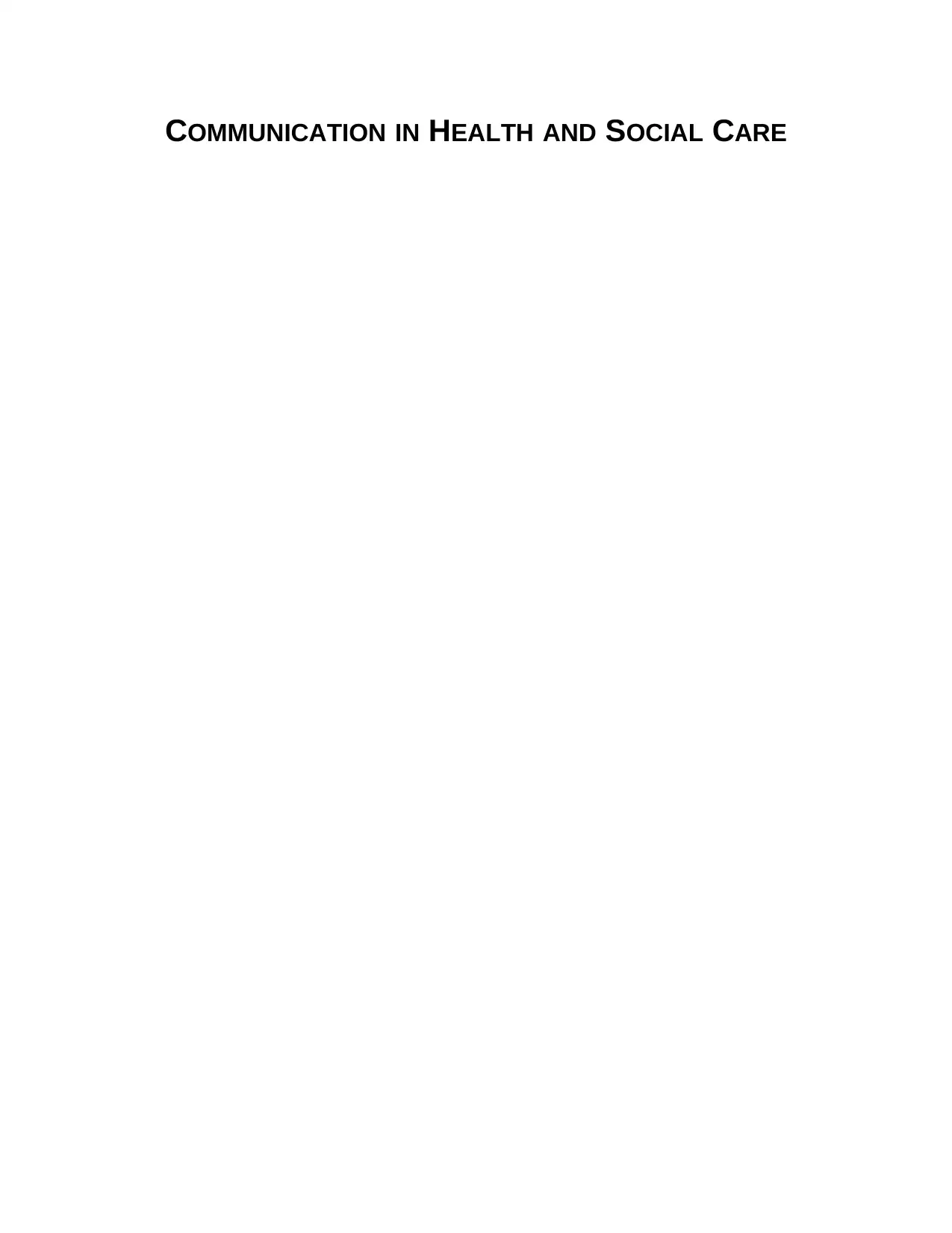
COMMUNICATION IN HEALTH AND SOCIAL CARE
Paraphrase This Document
Need a fresh take? Get an instant paraphrase of this document with our AI Paraphraser
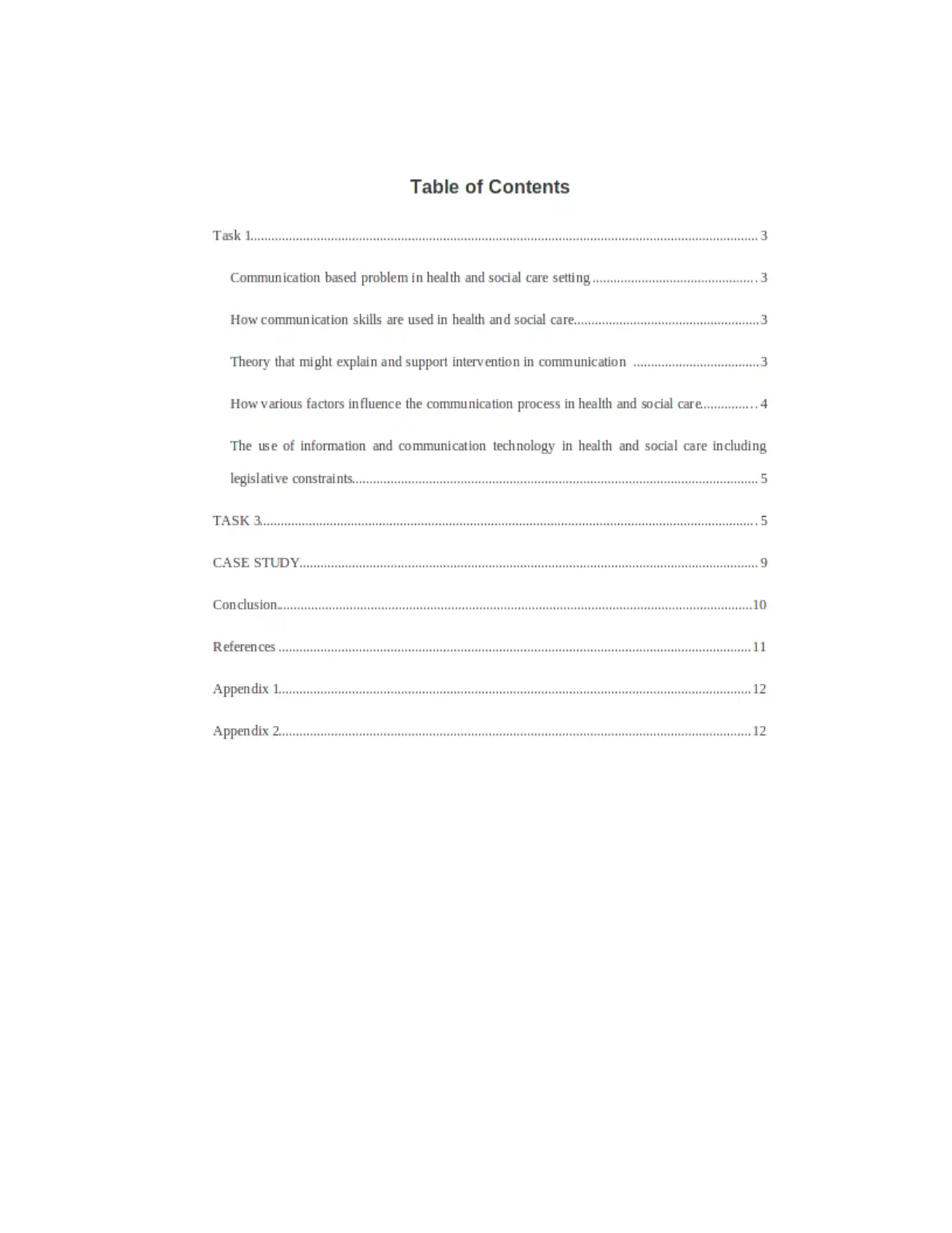
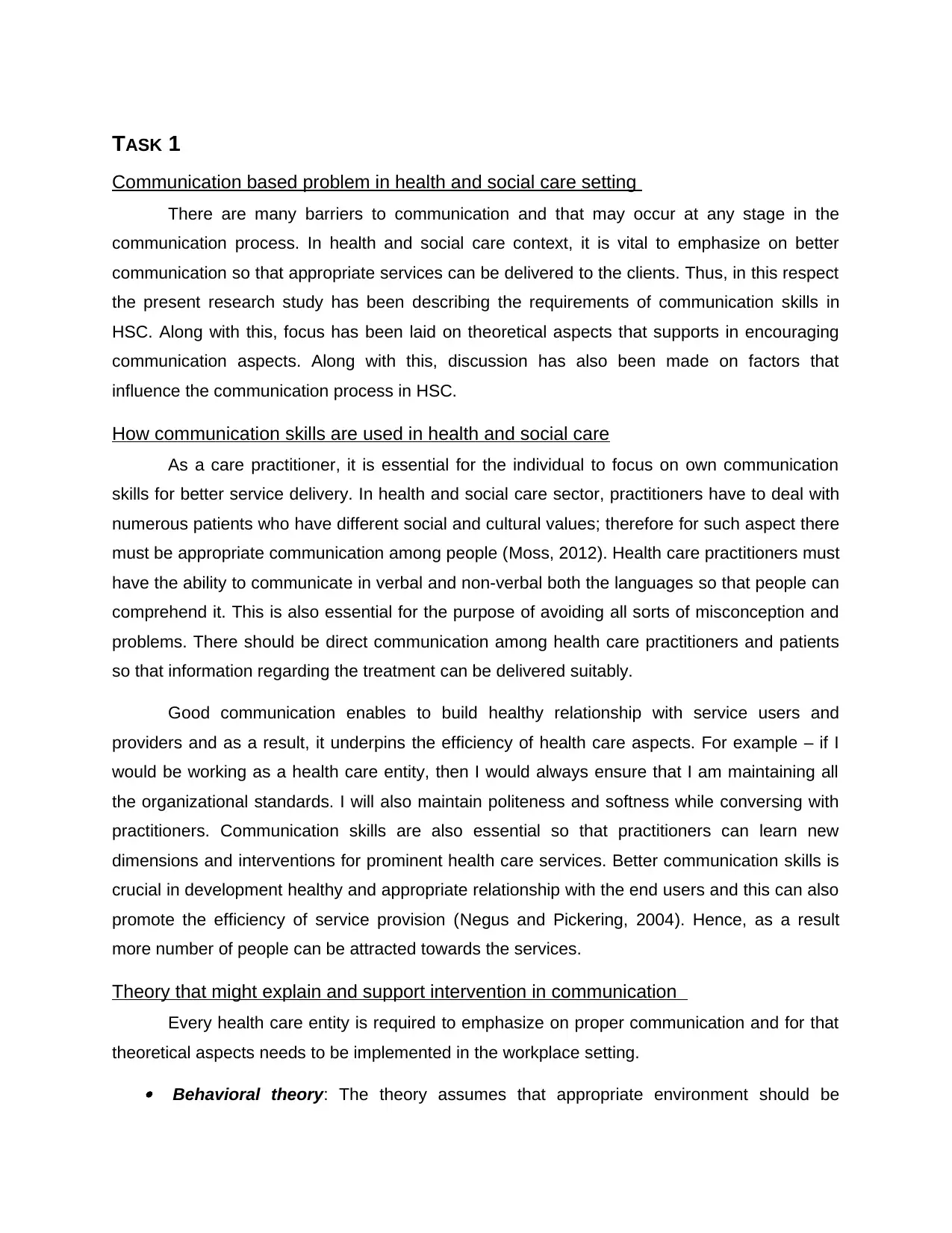
TASK 1
Communication based problem in health and social care setting
There are many barriers to communication and that may occur at any stage in the
communication process. In health and social care context, it is vital to emphasize on better
communication so that appropriate services can be delivered to the clients. Thus, in this respect
the present research study has been describing the requirements of communication skills in
HSC. Along with this, focus has been laid on theoretical aspects that supports in encouraging
communication aspects. Along with this, discussion has also been made on factors that
influence the communication process in HSC.
How communication skills are used in health and social care
As a care practitioner, it is essential for the individual to focus on own communication
skills for better service delivery. In health and social care sector, practitioners have to deal with
numerous patients who have different social and cultural values; therefore for such aspect there
must be appropriate communication among people (Moss, 2012). Health care practitioners must
have the ability to communicate in verbal and non-verbal both the languages so that people can
comprehend it. This is also essential for the purpose of avoiding all sorts of misconception and
problems. There should be direct communication among health care practitioners and patients
so that information regarding the treatment can be delivered suitably.
Good communication enables to build healthy relationship with service users and
providers and as a result, it underpins the efficiency of health care aspects. For example – if I
would be working as a health care entity, then I would always ensure that I am maintaining all
the organizational standards. I will also maintain politeness and softness while conversing with
practitioners. Communication skills are also essential so that practitioners can learn new
dimensions and interventions for prominent health care services. Better communication skills is
crucial in development healthy and appropriate relationship with the end users and this can also
promote the efficiency of service provision (Negus and Pickering, 2004). Hence, as a result
more number of people can be attracted towards the services.
Theory that might explain and support intervention in communication
Every health care entity is required to emphasize on proper communication and for that
theoretical aspects needs to be implemented in the workplace setting. Behavioral theory: The theory assumes that appropriate environment should be
Communication based problem in health and social care setting
There are many barriers to communication and that may occur at any stage in the
communication process. In health and social care context, it is vital to emphasize on better
communication so that appropriate services can be delivered to the clients. Thus, in this respect
the present research study has been describing the requirements of communication skills in
HSC. Along with this, focus has been laid on theoretical aspects that supports in encouraging
communication aspects. Along with this, discussion has also been made on factors that
influence the communication process in HSC.
How communication skills are used in health and social care
As a care practitioner, it is essential for the individual to focus on own communication
skills for better service delivery. In health and social care sector, practitioners have to deal with
numerous patients who have different social and cultural values; therefore for such aspect there
must be appropriate communication among people (Moss, 2012). Health care practitioners must
have the ability to communicate in verbal and non-verbal both the languages so that people can
comprehend it. This is also essential for the purpose of avoiding all sorts of misconception and
problems. There should be direct communication among health care practitioners and patients
so that information regarding the treatment can be delivered suitably.
Good communication enables to build healthy relationship with service users and
providers and as a result, it underpins the efficiency of health care aspects. For example – if I
would be working as a health care entity, then I would always ensure that I am maintaining all
the organizational standards. I will also maintain politeness and softness while conversing with
practitioners. Communication skills are also essential so that practitioners can learn new
dimensions and interventions for prominent health care services. Better communication skills is
crucial in development healthy and appropriate relationship with the end users and this can also
promote the efficiency of service provision (Negus and Pickering, 2004). Hence, as a result
more number of people can be attracted towards the services.
Theory that might explain and support intervention in communication
Every health care entity is required to emphasize on proper communication and for that
theoretical aspects needs to be implemented in the workplace setting. Behavioral theory: The theory assumes that appropriate environment should be
⊘ This is a preview!⊘
Do you want full access?
Subscribe today to unlock all pages.

Trusted by 1+ million students worldwide
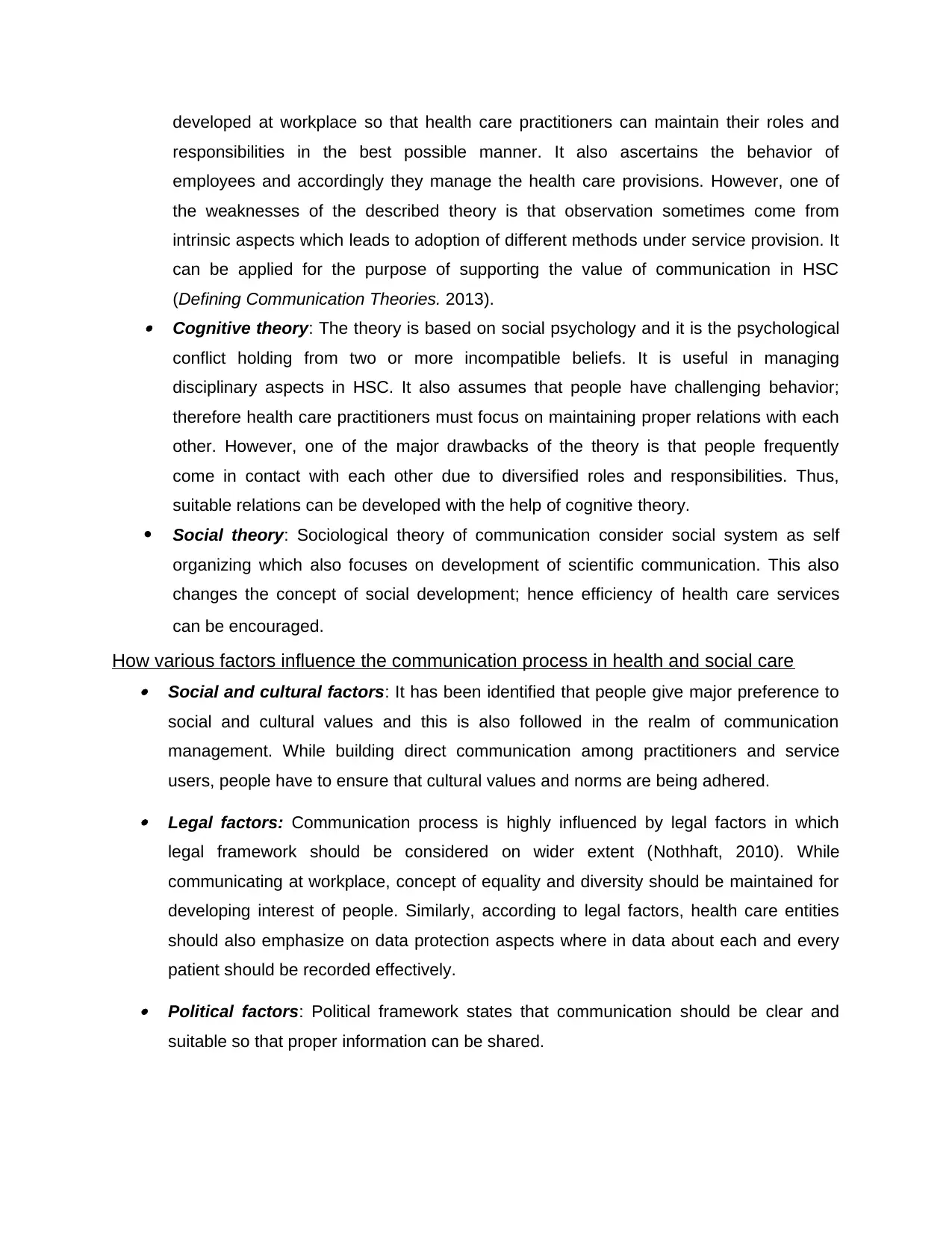
developed at workplace so that health care practitioners can maintain their roles and
responsibilities in the best possible manner. It also ascertains the behavior of
employees and accordingly they manage the health care provisions. However, one of
the weaknesses of the described theory is that observation sometimes come from
intrinsic aspects which leads to adoption of different methods under service provision. It
can be applied for the purpose of supporting the value of communication in HSC
(Defining Communication Theories. 2013).
Cognitive theory: The theory is based on social psychology and it is the psychological
conflict holding from two or more incompatible beliefs. It is useful in managing
disciplinary aspects in HSC. It also assumes that people have challenging behavior;
therefore health care practitioners must focus on maintaining proper relations with each
other. However, one of the major drawbacks of the theory is that people frequently
come in contact with each other due to diversified roles and responsibilities. Thus,
suitable relations can be developed with the help of cognitive theory.
Social theory: Sociological theory of communication consider social system as self
organizing which also focuses on development of scientific communication. This also
changes the concept of social development; hence efficiency of health care services
can be encouraged.
How various factors influence the communication process in health and social care Social and cultural factors: It has been identified that people give major preference to
social and cultural values and this is also followed in the realm of communication
management. While building direct communication among practitioners and service
users, people have to ensure that cultural values and norms are being adhered. Legal factors: Communication process is highly influenced by legal factors in which
legal framework should be considered on wider extent (Nothhaft, 2010). While
communicating at workplace, concept of equality and diversity should be maintained for
developing interest of people. Similarly, according to legal factors, health care entities
should also emphasize on data protection aspects where in data about each and every
patient should be recorded effectively. Political factors: Political framework states that communication should be clear and
suitable so that proper information can be shared.
responsibilities in the best possible manner. It also ascertains the behavior of
employees and accordingly they manage the health care provisions. However, one of
the weaknesses of the described theory is that observation sometimes come from
intrinsic aspects which leads to adoption of different methods under service provision. It
can be applied for the purpose of supporting the value of communication in HSC
(Defining Communication Theories. 2013).
Cognitive theory: The theory is based on social psychology and it is the psychological
conflict holding from two or more incompatible beliefs. It is useful in managing
disciplinary aspects in HSC. It also assumes that people have challenging behavior;
therefore health care practitioners must focus on maintaining proper relations with each
other. However, one of the major drawbacks of the theory is that people frequently
come in contact with each other due to diversified roles and responsibilities. Thus,
suitable relations can be developed with the help of cognitive theory.
Social theory: Sociological theory of communication consider social system as self
organizing which also focuses on development of scientific communication. This also
changes the concept of social development; hence efficiency of health care services
can be encouraged.
How various factors influence the communication process in health and social care Social and cultural factors: It has been identified that people give major preference to
social and cultural values and this is also followed in the realm of communication
management. While building direct communication among practitioners and service
users, people have to ensure that cultural values and norms are being adhered. Legal factors: Communication process is highly influenced by legal factors in which
legal framework should be considered on wider extent (Nothhaft, 2010). While
communicating at workplace, concept of equality and diversity should be maintained for
developing interest of people. Similarly, according to legal factors, health care entities
should also emphasize on data protection aspects where in data about each and every
patient should be recorded effectively. Political factors: Political framework states that communication should be clear and
suitable so that proper information can be shared.
Paraphrase This Document
Need a fresh take? Get an instant paraphrase of this document with our AI Paraphraser
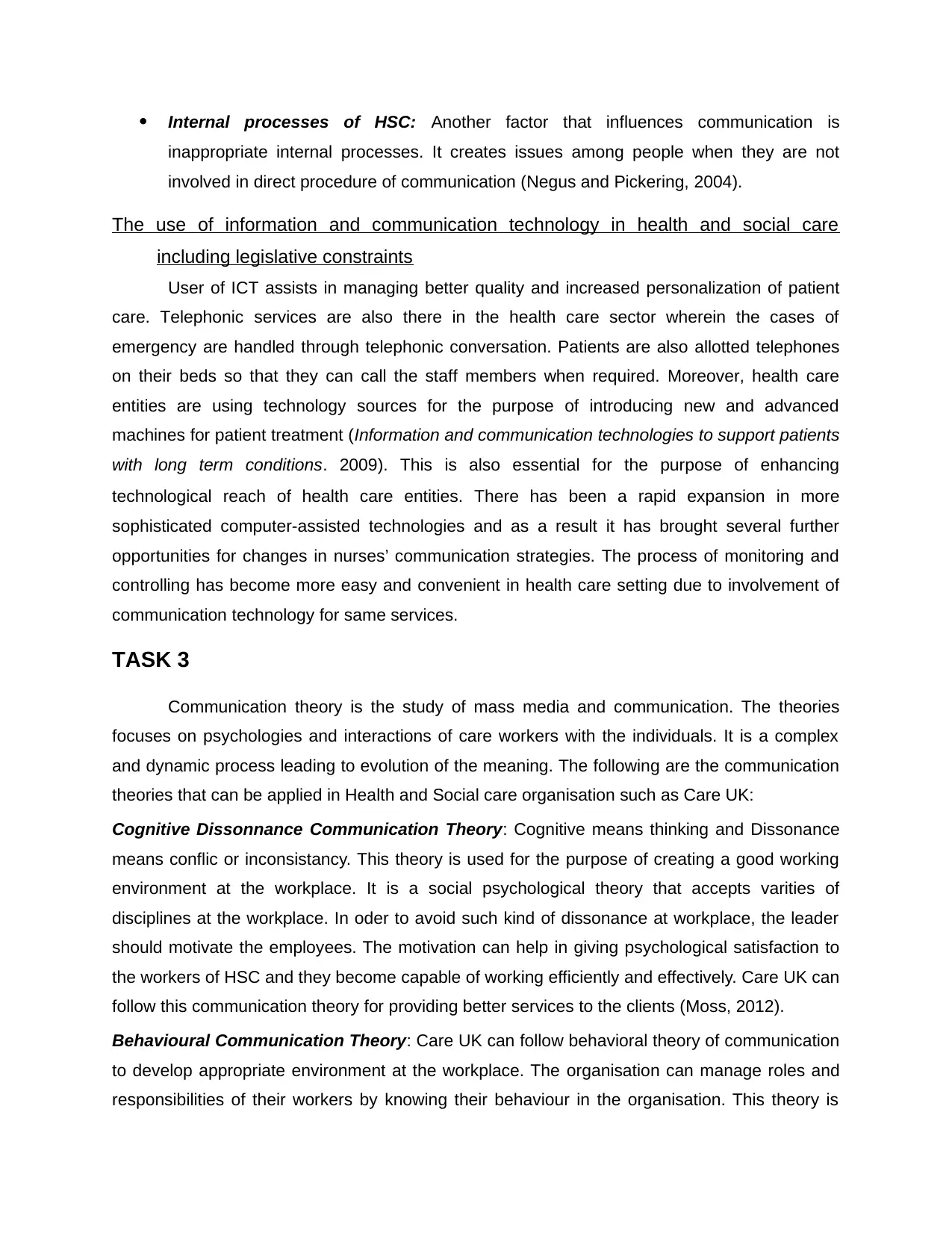
Internal processes of HSC: Another factor that influences communication is
inappropriate internal processes. It creates issues among people when they are not
involved in direct procedure of communication (Negus and Pickering, 2004).
The use of information and communication technology in health and social care
including legislative constraints
User of ICT assists in managing better quality and increased personalization of patient
care. Telephonic services are also there in the health care sector wherein the cases of
emergency are handled through telephonic conversation. Patients are also allotted telephones
on their beds so that they can call the staff members when required. Moreover, health care
entities are using technology sources for the purpose of introducing new and advanced
machines for patient treatment (Information and communication technologies to support patients
with long term conditions. 2009). This is also essential for the purpose of enhancing
technological reach of health care entities. There has been a rapid expansion in more
sophisticated computer-assisted technologies and as a result it has brought several further
opportunities for changes in nurses’ communication strategies. The process of monitoring and
controlling has become more easy and convenient in health care setting due to involvement of
communication technology for same services.
TASK 3
Communication theory is the study of mass media and communication. The theories
focuses on psychologies and interactions of care workers with the individuals. It is a complex
and dynamic process leading to evolution of the meaning. The following are the communication
theories that can be applied in Health and Social care organisation such as Care UK:
Cognitive Dissonnance Communication Theory: Cognitive means thinking and Dissonance
means conflic or inconsistancy. This theory is used for the purpose of creating a good working
environment at the workplace. It is a social psychological theory that accepts varities of
disciplines at the workplace. In oder to avoid such kind of dissonance at workplace, the leader
should motivate the employees. The motivation can help in giving psychological satisfaction to
the workers of HSC and they become capable of working efficiently and effectively. Care UK can
follow this communication theory for providing better services to the clients (Moss, 2012).
Behavioural Communication Theory: Care UK can follow behavioral theory of communication
to develop appropriate environment at the workplace. The organisation can manage roles and
responsibilities of their workers by knowing their behaviour in the organisation. This theory is
inappropriate internal processes. It creates issues among people when they are not
involved in direct procedure of communication (Negus and Pickering, 2004).
The use of information and communication technology in health and social care
including legislative constraints
User of ICT assists in managing better quality and increased personalization of patient
care. Telephonic services are also there in the health care sector wherein the cases of
emergency are handled through telephonic conversation. Patients are also allotted telephones
on their beds so that they can call the staff members when required. Moreover, health care
entities are using technology sources for the purpose of introducing new and advanced
machines for patient treatment (Information and communication technologies to support patients
with long term conditions. 2009). This is also essential for the purpose of enhancing
technological reach of health care entities. There has been a rapid expansion in more
sophisticated computer-assisted technologies and as a result it has brought several further
opportunities for changes in nurses’ communication strategies. The process of monitoring and
controlling has become more easy and convenient in health care setting due to involvement of
communication technology for same services.
TASK 3
Communication theory is the study of mass media and communication. The theories
focuses on psychologies and interactions of care workers with the individuals. It is a complex
and dynamic process leading to evolution of the meaning. The following are the communication
theories that can be applied in Health and Social care organisation such as Care UK:
Cognitive Dissonnance Communication Theory: Cognitive means thinking and Dissonance
means conflic or inconsistancy. This theory is used for the purpose of creating a good working
environment at the workplace. It is a social psychological theory that accepts varities of
disciplines at the workplace. In oder to avoid such kind of dissonance at workplace, the leader
should motivate the employees. The motivation can help in giving psychological satisfaction to
the workers of HSC and they become capable of working efficiently and effectively. Care UK can
follow this communication theory for providing better services to the clients (Moss, 2012).
Behavioural Communication Theory: Care UK can follow behavioral theory of communication
to develop appropriate environment at the workplace. The organisation can manage roles and
responsibilities of their workers by knowing their behaviour in the organisation. This theory is
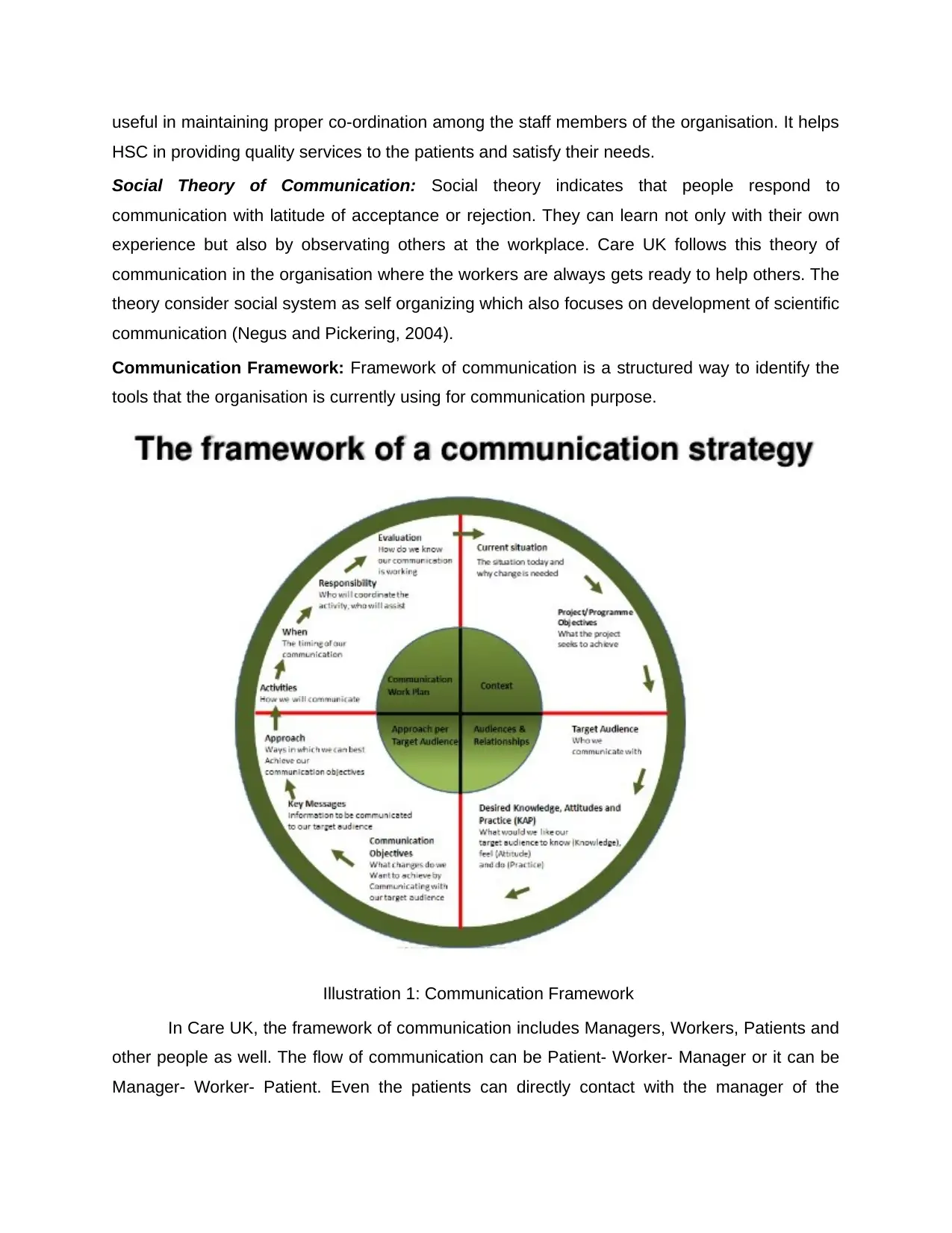
useful in maintaining proper co-ordination among the staff members of the organisation. It helps
HSC in providing quality services to the patients and satisfy their needs.
Social Theory of Communication: Social theory indicates that people respond to
communication with latitude of acceptance or rejection. They can learn not only with their own
experience but also by observating others at the workplace. Care UK follows this theory of
communication in the organisation where the workers are always gets ready to help others. The
theory consider social system as self organizing which also focuses on development of scientific
communication (Negus and Pickering, 2004).
Communication Framework: Framework of communication is a structured way to identify the
tools that the organisation is currently using for communication purpose.
Illustration 1: Communication Framework
In Care UK, the framework of communication includes Managers, Workers, Patients and
other people as well. The flow of communication can be Patient- Worker- Manager or it can be
Manager- Worker- Patient. Even the patients can directly contact with the manager of the
HSC in providing quality services to the patients and satisfy their needs.
Social Theory of Communication: Social theory indicates that people respond to
communication with latitude of acceptance or rejection. They can learn not only with their own
experience but also by observating others at the workplace. Care UK follows this theory of
communication in the organisation where the workers are always gets ready to help others. The
theory consider social system as self organizing which also focuses on development of scientific
communication (Negus and Pickering, 2004).
Communication Framework: Framework of communication is a structured way to identify the
tools that the organisation is currently using for communication purpose.
Illustration 1: Communication Framework
In Care UK, the framework of communication includes Managers, Workers, Patients and
other people as well. The flow of communication can be Patient- Worker- Manager or it can be
Manager- Worker- Patient. Even the patients can directly contact with the manager of the
⊘ This is a preview!⊘
Do you want full access?
Subscribe today to unlock all pages.

Trusted by 1+ million students worldwide
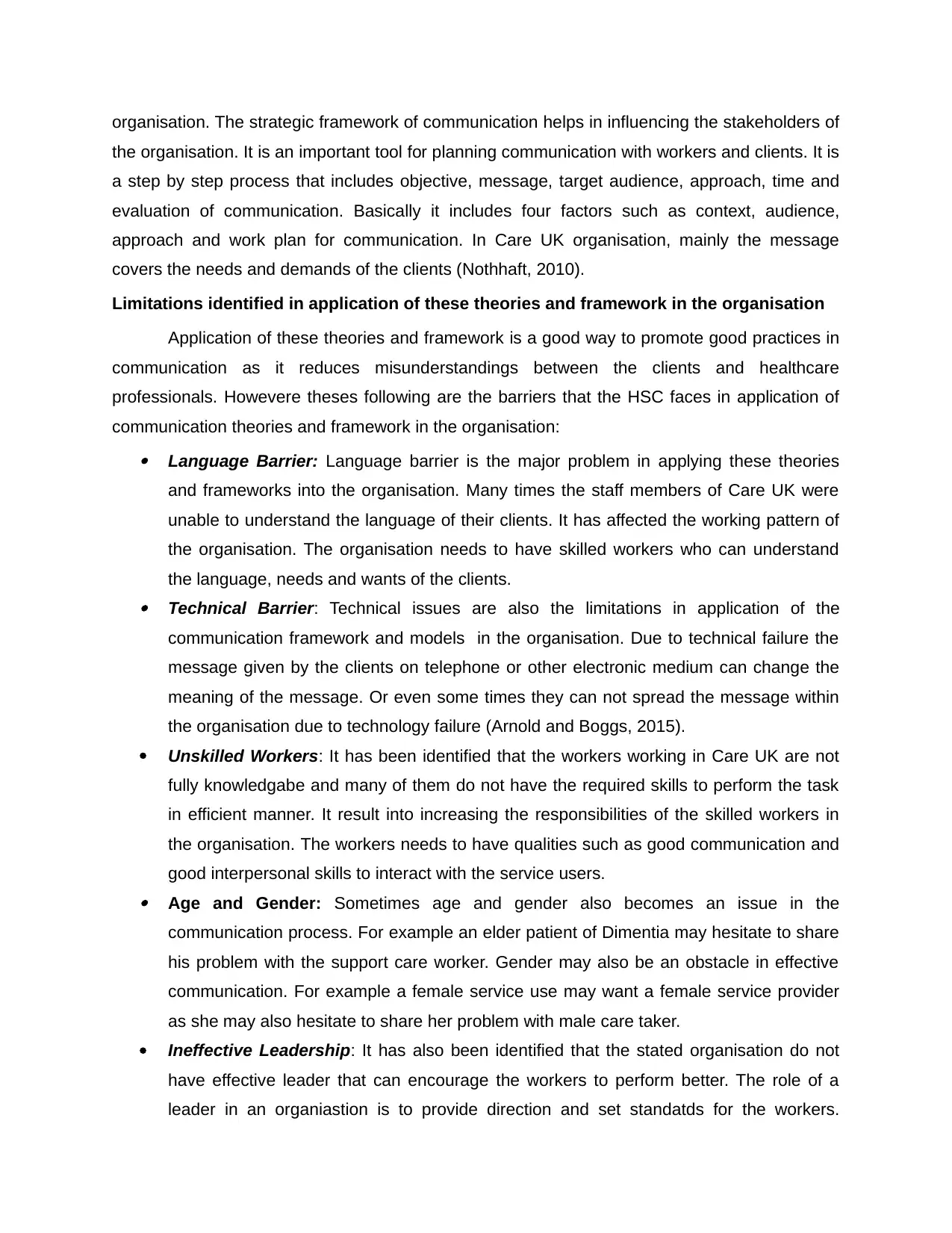
organisation. The strategic framework of communication helps in influencing the stakeholders of
the organisation. It is an important tool for planning communication with workers and clients. It is
a step by step process that includes objective, message, target audience, approach, time and
evaluation of communication. Basically it includes four factors such as context, audience,
approach and work plan for communication. In Care UK organisation, mainly the message
covers the needs and demands of the clients (Nothhaft, 2010).
Limitations identified in application of these theories and framework in the organisation
Application of these theories and framework is a good way to promote good practices in
communication as it reduces misunderstandings between the clients and healthcare
professionals. Howevere theses following are the barriers that the HSC faces in application of
communication theories and framework in the organisation: Language Barrier: Language barrier is the major problem in applying these theories
and frameworks into the organisation. Many times the staff members of Care UK were
unable to understand the language of their clients. It has affected the working pattern of
the organisation. The organisation needs to have skilled workers who can understand
the language, needs and wants of the clients. Technical Barrier: Technical issues are also the limitations in application of the
communication framework and models in the organisation. Due to technical failure the
message given by the clients on telephone or other electronic medium can change the
meaning of the message. Or even some times they can not spread the message within
the organisation due to technology failure (Arnold and Boggs, 2015).
Unskilled Workers: It has been identified that the workers working in Care UK are not
fully knowledgabe and many of them do not have the required skills to perform the task
in efficient manner. It result into increasing the responsibilities of the skilled workers in
the organisation. The workers needs to have qualities such as good communication and
good interpersonal skills to interact with the service users. Age and Gender: Sometimes age and gender also becomes an issue in the
communication process. For example an elder patient of Dimentia may hesitate to share
his problem with the support care worker. Gender may also be an obstacle in effective
communication. For example a female service use may want a female service provider
as she may also hesitate to share her problem with male care taker.
Ineffective Leadership: It has also been identified that the stated organisation do not
have effective leader that can encourage the workers to perform better. The role of a
leader in an organiastion is to provide direction and set standatds for the workers.
the organisation. It is an important tool for planning communication with workers and clients. It is
a step by step process that includes objective, message, target audience, approach, time and
evaluation of communication. Basically it includes four factors such as context, audience,
approach and work plan for communication. In Care UK organisation, mainly the message
covers the needs and demands of the clients (Nothhaft, 2010).
Limitations identified in application of these theories and framework in the organisation
Application of these theories and framework is a good way to promote good practices in
communication as it reduces misunderstandings between the clients and healthcare
professionals. Howevere theses following are the barriers that the HSC faces in application of
communication theories and framework in the organisation: Language Barrier: Language barrier is the major problem in applying these theories
and frameworks into the organisation. Many times the staff members of Care UK were
unable to understand the language of their clients. It has affected the working pattern of
the organisation. The organisation needs to have skilled workers who can understand
the language, needs and wants of the clients. Technical Barrier: Technical issues are also the limitations in application of the
communication framework and models in the organisation. Due to technical failure the
message given by the clients on telephone or other electronic medium can change the
meaning of the message. Or even some times they can not spread the message within
the organisation due to technology failure (Arnold and Boggs, 2015).
Unskilled Workers: It has been identified that the workers working in Care UK are not
fully knowledgabe and many of them do not have the required skills to perform the task
in efficient manner. It result into increasing the responsibilities of the skilled workers in
the organisation. The workers needs to have qualities such as good communication and
good interpersonal skills to interact with the service users. Age and Gender: Sometimes age and gender also becomes an issue in the
communication process. For example an elder patient of Dimentia may hesitate to share
his problem with the support care worker. Gender may also be an obstacle in effective
communication. For example a female service use may want a female service provider
as she may also hesitate to share her problem with male care taker.
Ineffective Leadership: It has also been identified that the stated organisation do not
have effective leader that can encourage the workers to perform better. The role of a
leader in an organiastion is to provide direction and set standatds for the workers.
Paraphrase This Document
Need a fresh take? Get an instant paraphrase of this document with our AI Paraphraser
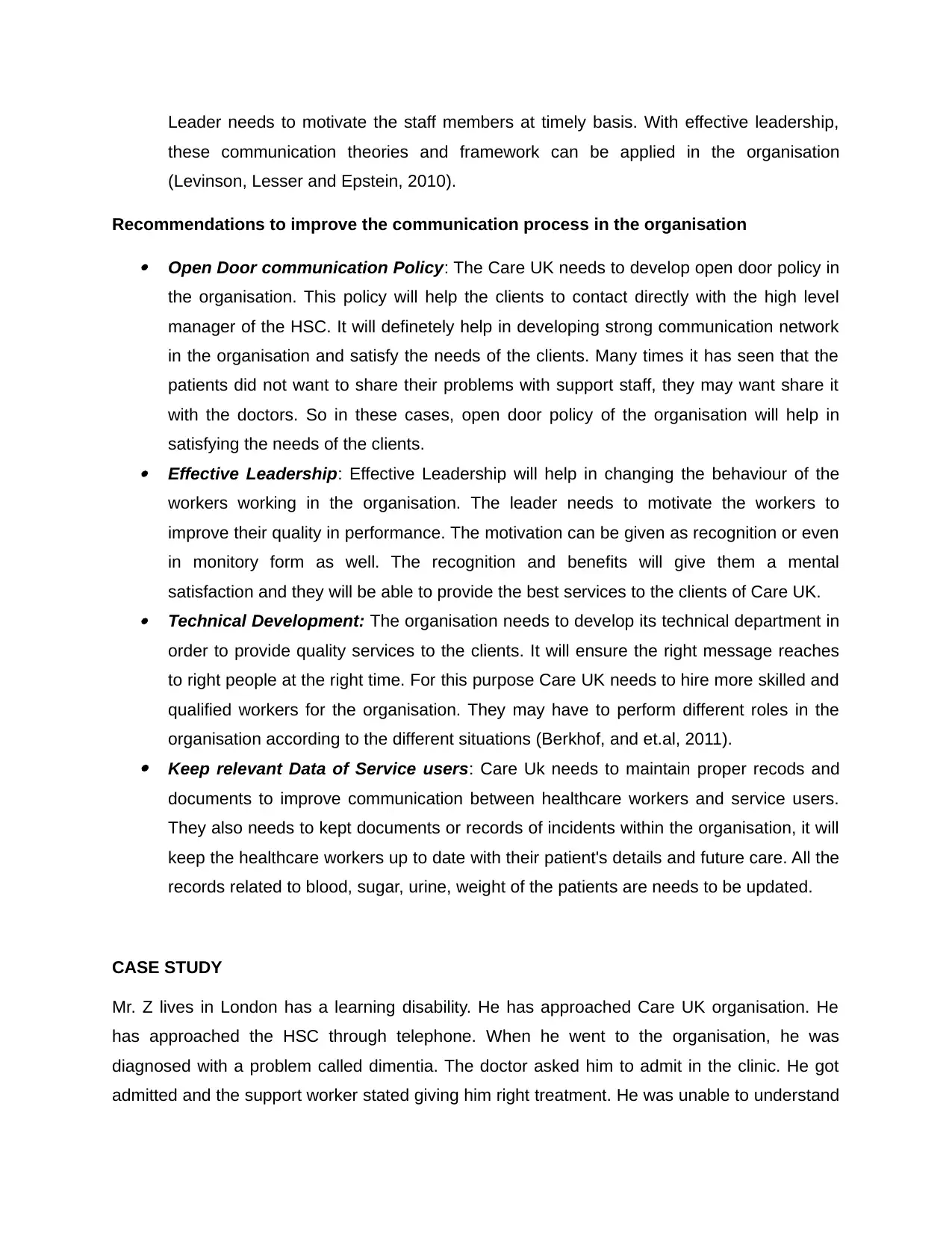
Leader needs to motivate the staff members at timely basis. With effective leadership,
these communication theories and framework can be applied in the organisation
(Levinson, Lesser and Epstein, 2010).
Recommendations to improve the communication process in the organisation Open Door communication Policy: The Care UK needs to develop open door policy in
the organisation. This policy will help the clients to contact directly with the high level
manager of the HSC. It will definetely help in developing strong communication network
in the organisation and satisfy the needs of the clients. Many times it has seen that the
patients did not want to share their problems with support staff, they may want share it
with the doctors. So in these cases, open door policy of the organisation will help in
satisfying the needs of the clients. Effective Leadership: Effective Leadership will help in changing the behaviour of the
workers working in the organisation. The leader needs to motivate the workers to
improve their quality in performance. The motivation can be given as recognition or even
in monitory form as well. The recognition and benefits will give them a mental
satisfaction and they will be able to provide the best services to the clients of Care UK. Technical Development: The organisation needs to develop its technical department in
order to provide quality services to the clients. It will ensure the right message reaches
to right people at the right time. For this purpose Care UK needs to hire more skilled and
qualified workers for the organisation. They may have to perform different roles in the
organisation according to the different situations (Berkhof, and et.al, 2011). Keep relevant Data of Service users: Care Uk needs to maintain proper recods and
documents to improve communication between healthcare workers and service users.
They also needs to kept documents or records of incidents within the organisation, it will
keep the healthcare workers up to date with their patient's details and future care. All the
records related to blood, sugar, urine, weight of the patients are needs to be updated.
CASE STUDY
Mr. Z lives in London has a learning disability. He has approached Care UK organisation. He
has approached the HSC through telephone. When he went to the organisation, he was
diagnosed with a problem called dimentia. The doctor asked him to admit in the clinic. He got
admitted and the support worker stated giving him right treatment. He was unable to understand
these communication theories and framework can be applied in the organisation
(Levinson, Lesser and Epstein, 2010).
Recommendations to improve the communication process in the organisation Open Door communication Policy: The Care UK needs to develop open door policy in
the organisation. This policy will help the clients to contact directly with the high level
manager of the HSC. It will definetely help in developing strong communication network
in the organisation and satisfy the needs of the clients. Many times it has seen that the
patients did not want to share their problems with support staff, they may want share it
with the doctors. So in these cases, open door policy of the organisation will help in
satisfying the needs of the clients. Effective Leadership: Effective Leadership will help in changing the behaviour of the
workers working in the organisation. The leader needs to motivate the workers to
improve their quality in performance. The motivation can be given as recognition or even
in monitory form as well. The recognition and benefits will give them a mental
satisfaction and they will be able to provide the best services to the clients of Care UK. Technical Development: The organisation needs to develop its technical department in
order to provide quality services to the clients. It will ensure the right message reaches
to right people at the right time. For this purpose Care UK needs to hire more skilled and
qualified workers for the organisation. They may have to perform different roles in the
organisation according to the different situations (Berkhof, and et.al, 2011). Keep relevant Data of Service users: Care Uk needs to maintain proper recods and
documents to improve communication between healthcare workers and service users.
They also needs to kept documents or records of incidents within the organisation, it will
keep the healthcare workers up to date with their patient's details and future care. All the
records related to blood, sugar, urine, weight of the patients are needs to be updated.
CASE STUDY
Mr. Z lives in London has a learning disability. He has approached Care UK organisation. He
has approached the HSC through telephone. When he went to the organisation, he was
diagnosed with a problem called dimentia. The doctor asked him to admit in the clinic. He got
admitted and the support worker stated giving him right treatment. He was unable to understand
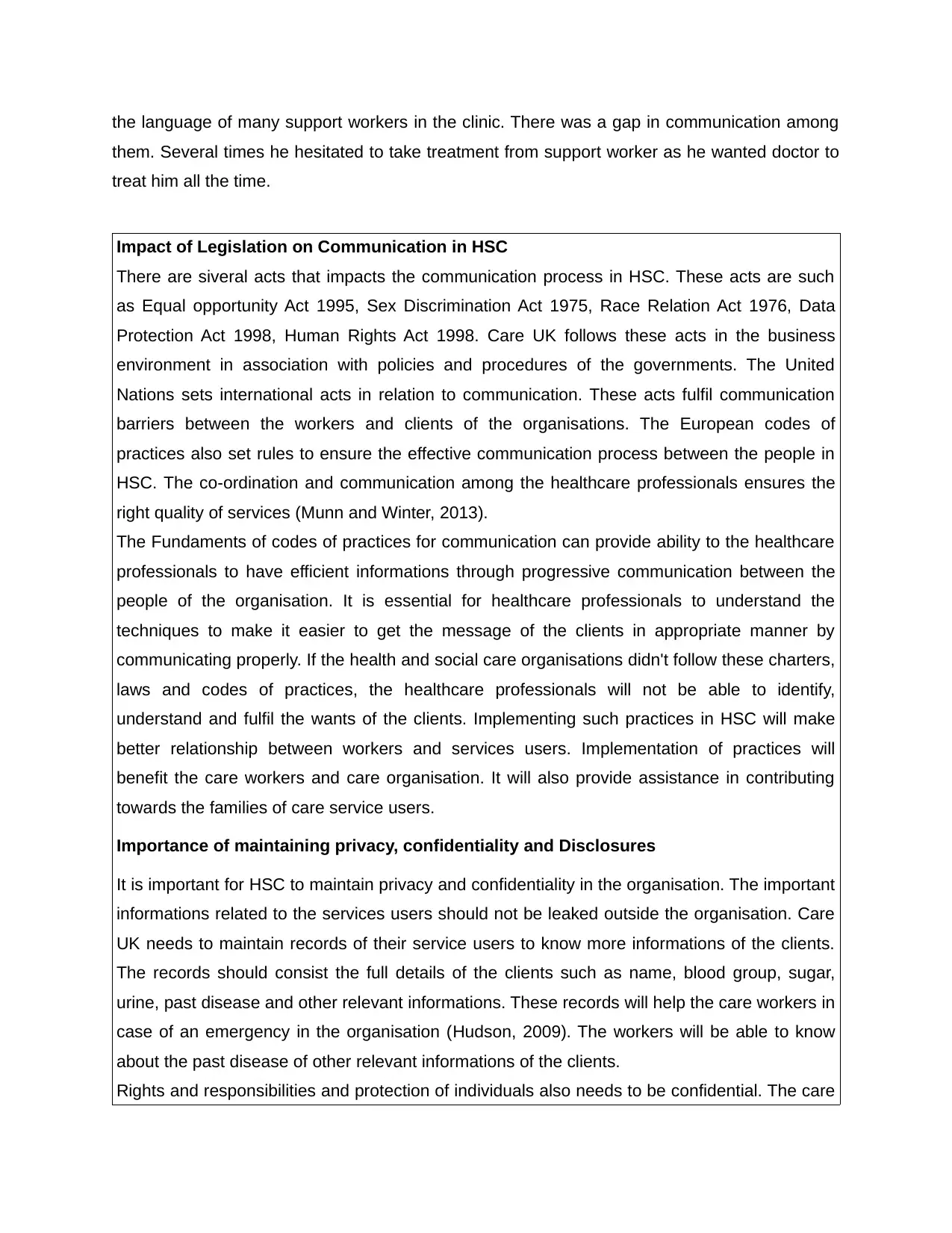
the language of many support workers in the clinic. There was a gap in communication among
them. Several times he hesitated to take treatment from support worker as he wanted doctor to
treat him all the time.
Impact of Legislation on Communication in HSC
There are siveral acts that impacts the communication process in HSC. These acts are such
as Equal opportunity Act 1995, Sex Discrimination Act 1975, Race Relation Act 1976, Data
Protection Act 1998, Human Rights Act 1998. Care UK follows these acts in the business
environment in association with policies and procedures of the governments. The United
Nations sets international acts in relation to communication. These acts fulfil communication
barriers between the workers and clients of the organisations. The European codes of
practices also set rules to ensure the effective communication process between the people in
HSC. The co-ordination and communication among the healthcare professionals ensures the
right quality of services (Munn and Winter, 2013).
The Fundaments of codes of practices for communication can provide ability to the healthcare
professionals to have efficient informations through progressive communication between the
people of the organisation. It is essential for healthcare professionals to understand the
techniques to make it easier to get the message of the clients in appropriate manner by
communicating properly. If the health and social care organisations didn't follow these charters,
laws and codes of practices, the healthcare professionals will not be able to identify,
understand and fulfil the wants of the clients. Implementing such practices in HSC will make
better relationship between workers and services users. Implementation of practices will
benefit the care workers and care organisation. It will also provide assistance in contributing
towards the families of care service users.
Importance of maintaining privacy, confidentiality and Disclosures
It is important for HSC to maintain privacy and confidentiality in the organisation. The important
informations related to the services users should not be leaked outside the organisation. Care
UK needs to maintain records of their service users to know more informations of the clients.
The records should consist the full details of the clients such as name, blood group, sugar,
urine, past disease and other relevant informations. These records will help the care workers in
case of an emergency in the organisation (Hudson, 2009). The workers will be able to know
about the past disease of other relevant informations of the clients.
Rights and responsibilities and protection of individuals also needs to be confidential. The care
them. Several times he hesitated to take treatment from support worker as he wanted doctor to
treat him all the time.
Impact of Legislation on Communication in HSC
There are siveral acts that impacts the communication process in HSC. These acts are such
as Equal opportunity Act 1995, Sex Discrimination Act 1975, Race Relation Act 1976, Data
Protection Act 1998, Human Rights Act 1998. Care UK follows these acts in the business
environment in association with policies and procedures of the governments. The United
Nations sets international acts in relation to communication. These acts fulfil communication
barriers between the workers and clients of the organisations. The European codes of
practices also set rules to ensure the effective communication process between the people in
HSC. The co-ordination and communication among the healthcare professionals ensures the
right quality of services (Munn and Winter, 2013).
The Fundaments of codes of practices for communication can provide ability to the healthcare
professionals to have efficient informations through progressive communication between the
people of the organisation. It is essential for healthcare professionals to understand the
techniques to make it easier to get the message of the clients in appropriate manner by
communicating properly. If the health and social care organisations didn't follow these charters,
laws and codes of practices, the healthcare professionals will not be able to identify,
understand and fulfil the wants of the clients. Implementing such practices in HSC will make
better relationship between workers and services users. Implementation of practices will
benefit the care workers and care organisation. It will also provide assistance in contributing
towards the families of care service users.
Importance of maintaining privacy, confidentiality and Disclosures
It is important for HSC to maintain privacy and confidentiality in the organisation. The important
informations related to the services users should not be leaked outside the organisation. Care
UK needs to maintain records of their service users to know more informations of the clients.
The records should consist the full details of the clients such as name, blood group, sugar,
urine, past disease and other relevant informations. These records will help the care workers in
case of an emergency in the organisation (Hudson, 2009). The workers will be able to know
about the past disease of other relevant informations of the clients.
Rights and responsibilities and protection of individuals also needs to be confidential. The care
⊘ This is a preview!⊘
Do you want full access?
Subscribe today to unlock all pages.

Trusted by 1+ million students worldwide
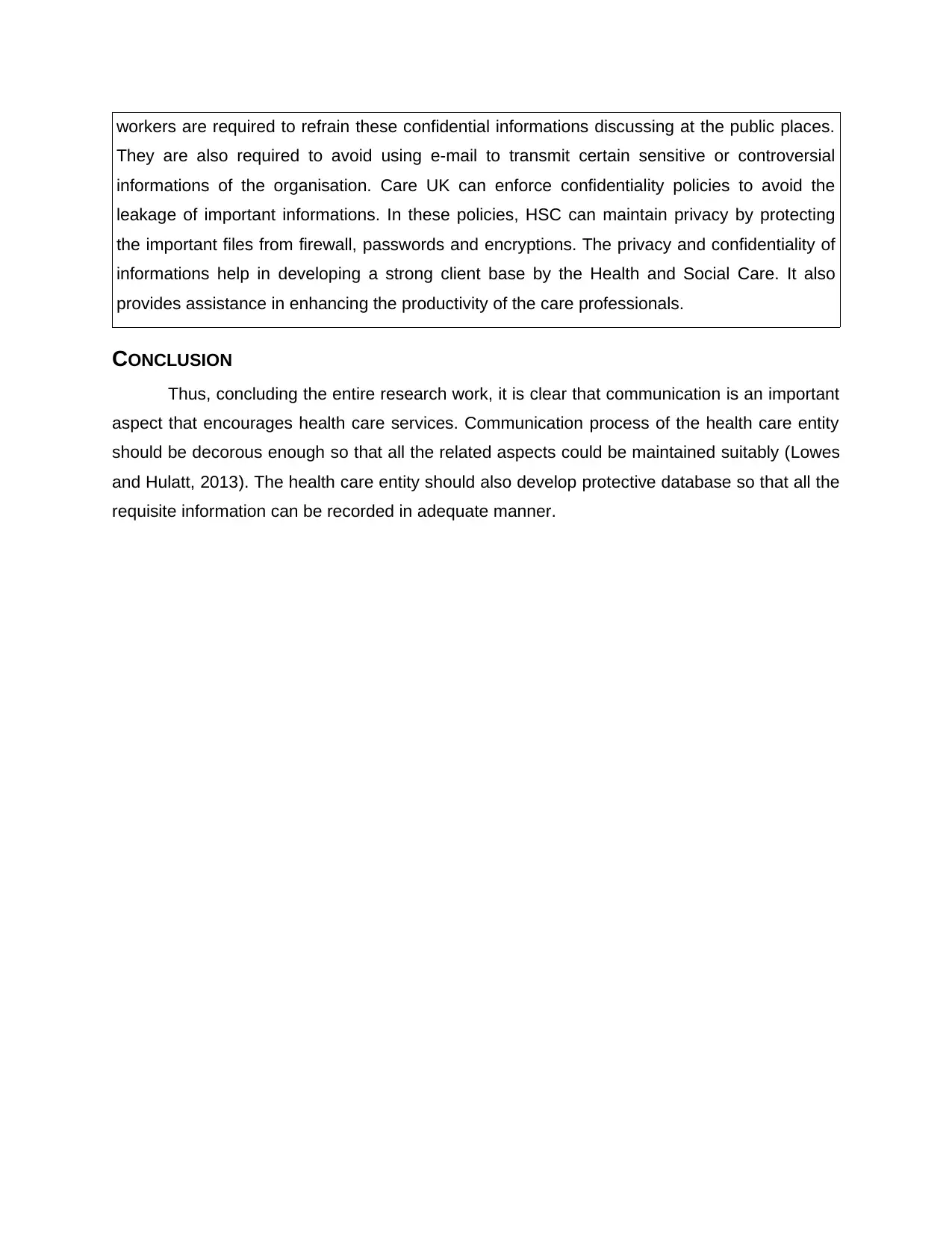
workers are required to refrain these confidential informations discussing at the public places.
They are also required to avoid using e-mail to transmit certain sensitive or controversial
informations of the organisation. Care UK can enforce confidentiality policies to avoid the
leakage of important informations. In these policies, HSC can maintain privacy by protecting
the important files from firewall, passwords and encryptions. The privacy and confidentiality of
informations help in developing a strong client base by the Health and Social Care. It also
provides assistance in enhancing the productivity of the care professionals.
CONCLUSION
Thus, concluding the entire research work, it is clear that communication is an important
aspect that encourages health care services. Communication process of the health care entity
should be decorous enough so that all the related aspects could be maintained suitably (Lowes
and Hulatt, 2013). The health care entity should also develop protective database so that all the
requisite information can be recorded in adequate manner.
They are also required to avoid using e-mail to transmit certain sensitive or controversial
informations of the organisation. Care UK can enforce confidentiality policies to avoid the
leakage of important informations. In these policies, HSC can maintain privacy by protecting
the important files from firewall, passwords and encryptions. The privacy and confidentiality of
informations help in developing a strong client base by the Health and Social Care. It also
provides assistance in enhancing the productivity of the care professionals.
CONCLUSION
Thus, concluding the entire research work, it is clear that communication is an important
aspect that encourages health care services. Communication process of the health care entity
should be decorous enough so that all the related aspects could be maintained suitably (Lowes
and Hulatt, 2013). The health care entity should also develop protective database so that all the
requisite information can be recorded in adequate manner.
Paraphrase This Document
Need a fresh take? Get an instant paraphrase of this document with our AI Paraphraser
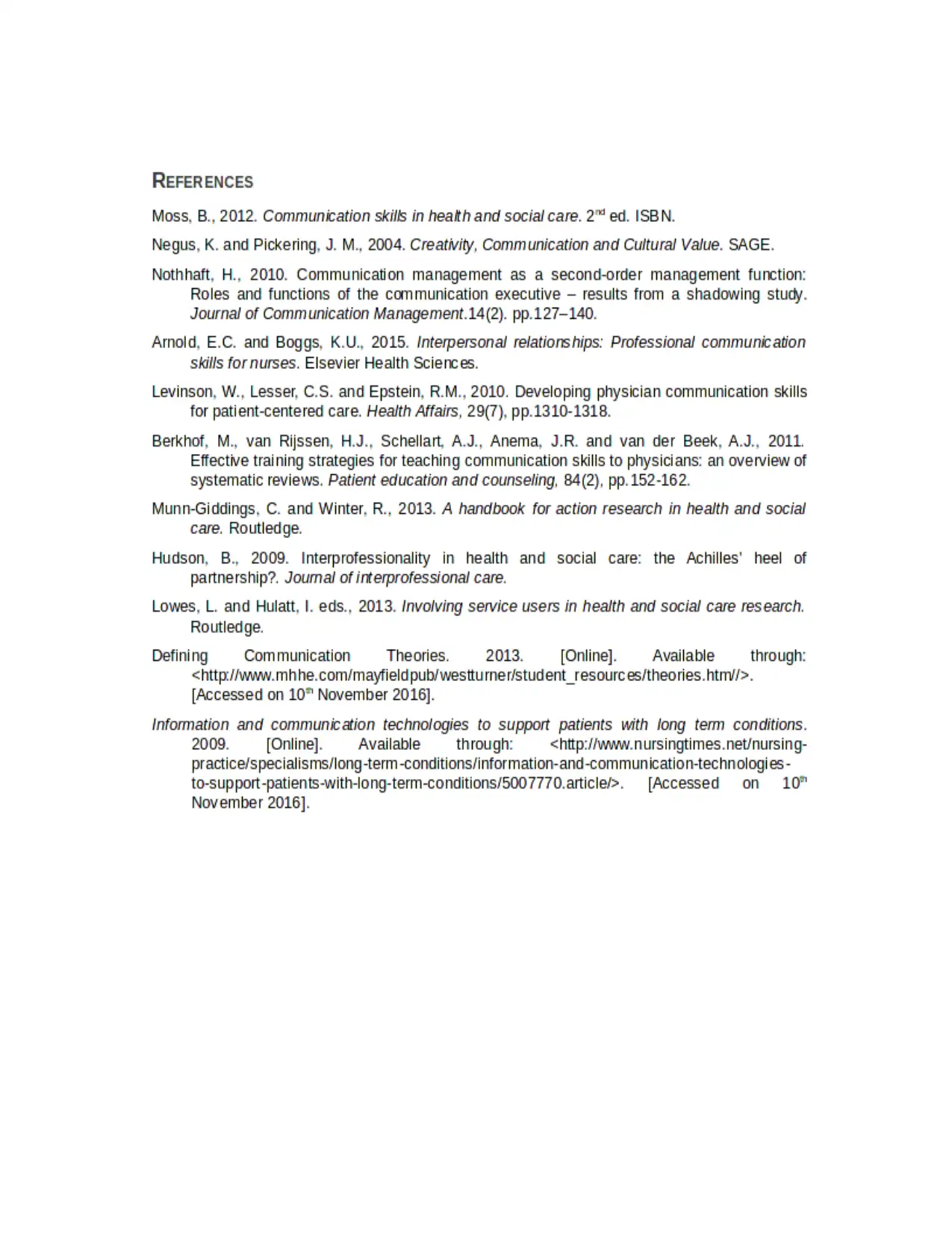
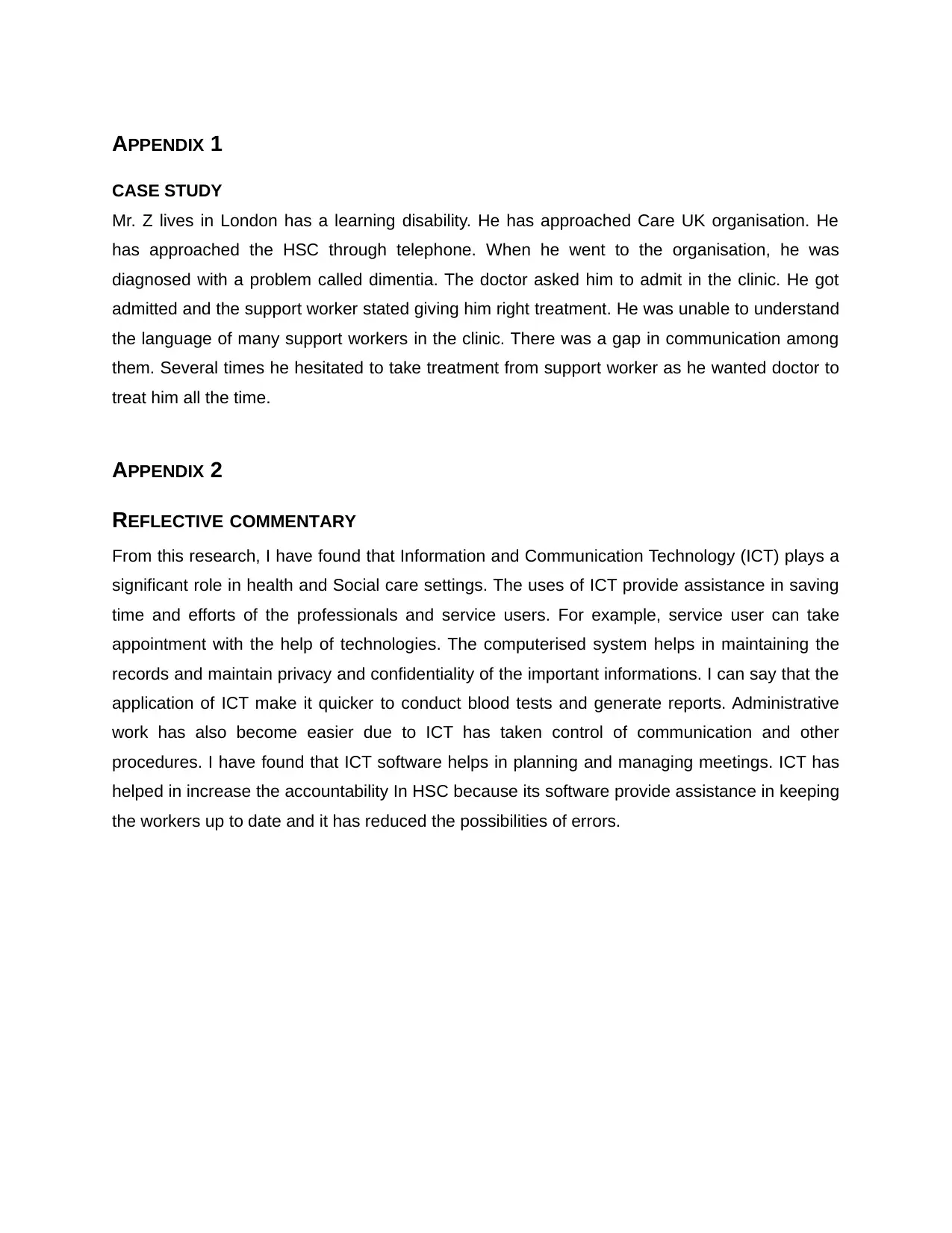
APPENDIX 1
CASE STUDY
Mr. Z lives in London has a learning disability. He has approached Care UK organisation. He
has approached the HSC through telephone. When he went to the organisation, he was
diagnosed with a problem called dimentia. The doctor asked him to admit in the clinic. He got
admitted and the support worker stated giving him right treatment. He was unable to understand
the language of many support workers in the clinic. There was a gap in communication among
them. Several times he hesitated to take treatment from support worker as he wanted doctor to
treat him all the time.
APPENDIX 2
REFLECTIVE COMMENTARY
From this research, I have found that Information and Communication Technology (ICT) plays a
significant role in health and Social care settings. The uses of ICT provide assistance in saving
time and efforts of the professionals and service users. For example, service user can take
appointment with the help of technologies. The computerised system helps in maintaining the
records and maintain privacy and confidentiality of the important informations. I can say that the
application of ICT make it quicker to conduct blood tests and generate reports. Administrative
work has also become easier due to ICT has taken control of communication and other
procedures. I have found that ICT software helps in planning and managing meetings. ICT has
helped in increase the accountability In HSC because its software provide assistance in keeping
the workers up to date and it has reduced the possibilities of errors.
CASE STUDY
Mr. Z lives in London has a learning disability. He has approached Care UK organisation. He
has approached the HSC through telephone. When he went to the organisation, he was
diagnosed with a problem called dimentia. The doctor asked him to admit in the clinic. He got
admitted and the support worker stated giving him right treatment. He was unable to understand
the language of many support workers in the clinic. There was a gap in communication among
them. Several times he hesitated to take treatment from support worker as he wanted doctor to
treat him all the time.
APPENDIX 2
REFLECTIVE COMMENTARY
From this research, I have found that Information and Communication Technology (ICT) plays a
significant role in health and Social care settings. The uses of ICT provide assistance in saving
time and efforts of the professionals and service users. For example, service user can take
appointment with the help of technologies. The computerised system helps in maintaining the
records and maintain privacy and confidentiality of the important informations. I can say that the
application of ICT make it quicker to conduct blood tests and generate reports. Administrative
work has also become easier due to ICT has taken control of communication and other
procedures. I have found that ICT software helps in planning and managing meetings. ICT has
helped in increase the accountability In HSC because its software provide assistance in keeping
the workers up to date and it has reduced the possibilities of errors.
⊘ This is a preview!⊘
Do you want full access?
Subscribe today to unlock all pages.

Trusted by 1+ million students worldwide
1 out of 12
Related Documents
Your All-in-One AI-Powered Toolkit for Academic Success.
+13062052269
info@desklib.com
Available 24*7 on WhatsApp / Email
![[object Object]](/_next/static/media/star-bottom.7253800d.svg)
Unlock your academic potential
Copyright © 2020–2026 A2Z Services. All Rights Reserved. Developed and managed by ZUCOL.




